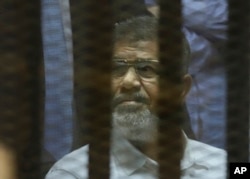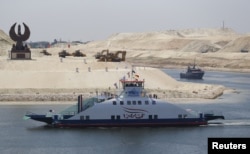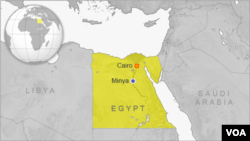When General Abdel Fattah el-Sissi swapped his uniform for a suit to become Egyptian president, he mapped out a return to democracy culminating in parliamentary elections. These start on Sunday, but the new chamber is unlikely to challenge what critics describe as his increasingly authoritarian rule.
With most of his opponents in jail and Western powers firmly behind him, Sissi is consolidating his hold on power more than a year into his first term and two years after he toppled Egypt's first freely elected president following mass protests.
It's a familiar script in Egypt, which has been ruled mostly by military strongmen since army officers overthrew King Farouk in 1952, say some observers: Ex-generals promise freedom and prosperity but end up governing with an iron fist and concluding they are untouchable.
"Sissi shows signs of seeing himself above politics," said Nathan Brown, professor at George Washington University in Washington. "My sense is that he sees himself as a chosen leader and not properly subject to any oversight."
Sissi says he is committed to turning the economy around; those who know the president describe him as a disciplinarian who is at his desk by 5 a.m., but one who listens to his advisers.
"He revises his decisions based on advice from people who know about the issue," said Sameh Seif Elyazal, a former intelligence officer who heads the leading loyalist alliance running in the elections and knows Sissi. "Others might say, 'No, I am president and my decision is final,' but he is not like that at all."
Sissi initially viewed as a savior
As army chief, Sissi removed Islamist President Mohamed Morsi from power in 2013. Security forces then shot dead hundreds of Morsi supporters and imprisoned thousands of members of his Muslim Brotherhood in the toughest crackdown on dissent in Egypt's modern history.
To many, Sissi was a savior who could get Egypt back on track after the upheaval triggered by the 2011 uprising that ended 30 years under Hosni Mubarak, a former air force chief.
Less than a year later, Egyptians who opposed the Brotherhood and regarded Sissi as a decisive leader who could bring stability, elected him president. They gave him 97 percent of the vote amid low turnout, a result reminiscent of presidential polls once held by Mubarak and derided by critics.
Images of Sissi in his trademark beret and sunglasses adorned posters, T-shirts, chocolates, even women's underwear.
That adulation has since worn off. While Sissi still enjoys wide support, there are growing signs of discontent with higher food prices, taxes and dire public healthcare in a country where 44 percent of recent graduates are unemployed.
"In general, with the way things are going in Egypt with the security situation and the economy, there is an increasing feeling here that things are not working out well," said Michele Dunne, director of the Carnegie Endowment's Middle East Program.
"It's not a happy picture and the promises that Sissi made are not coming through."
Delivering on promises
Like President Gamal Abdel Nasser, who overthrew the monarchy, Sissi has announced megaprojects to great fanfare, including a new capital with an airport larger than London's Heathrow and a building taller than the Eiffel Tower in Paris.
The Suez Canal was indeed expanded in just one year. But critics say such projects divert attention from politically sensitive reforms, such as cutting subsidies or slimming the civil service, that are needed to promote long-term economic growth.
Despite a large budget deficit and pressure on the currency, Sissi has gone on a military spending spree, buying French weapons, including combat jets and helicopter carriers. Cairo has also signed a $3.5 billion arms deal with Moscow, to the consternation of the West.
These billions could have been spent on health, education or developing infrastructure in the countryside, where barefoot children still play in dirt roads, Sissi's critics say.
Like past Egyptian presidents, Sissi has presented himself as an indispensable leader in the Arab world, pushing the idea of a united regional force to combat Islamic State militants. Yet hundreds of Egyptian soldiers have died fighting Islamist insurgents in North Sinai since Morsi's downfall.
New parliament
On paper, the new parliament to be elected in two rounds beginning October 18 will be powerful. It could, for instance, block Sissi's decision to support Saudi Arabia in its war against Iranian-backed rebels in Yemen, reject his choice of prime minister or even impeach the president himself.
But without candidates from the Brotherhood or the youth activists who were at the forefront of the 2011 uprising, parliament is likely to be stacked with members of the political elite who broadly support Sissi.
Speculation is rife that the constitution, passed by a referendum after Morsi's removal, may be amended.
Khaled Dawoud, a government critic who recently resigned as spokesman of the Destour Party, said Sissi's supporters may want to change a clause limiting the president to two four-year terms, rather than curb parliament's powers.
"Is it about the powers or is it about his terms?" he asked. "That's my main suspicion because I can't expect the next parliament will cause any problem whatsoever for the president."
Here to stay?
Egyptians may have their reservations but, with local rights groups estimating 40,000 political prisoners are behind bars, taking to the streets again could be risky.
Egypt has avoided the chaos engulfing Libya, Syria and Iraq, meaning the West is more likely to ignore any criticism that the elections are cosmetic. Sissi is also unlikely to be threatened internally as long as he does not antagonize the still powerful generals.
A debate among villagers on the outskirts of the southern city of Minya illustrates how Egyptians appear to accept Sissi's rule.
Sipping tea one recent warm, still night, local men waited for an election candidate to arrive in the village and talk turned to the turbulent past few years.
"Under Morsi, there was no electricity. Try and find petrol for your car here in Minya. There was no security, you were too scared to walk in the street after dark. Sissi is bringing security back," said one young man, a recent graduate.
Another man in a long green galabiya interjected, speaking softly, "Do you bring back security by putting all your opponents in jail?"
Sitting next to him, a man in a suit said Mubarak had brought some benefits. "Sissi has shown us only the stick so far, but it was needed," he said.
On one thing the villagers agreed: Sissi wouldn't be satisfied with just two terms.
"This is Egypt," said the man in the suit, his youthful features breaking out into a grin. "That doesn't happen here."








